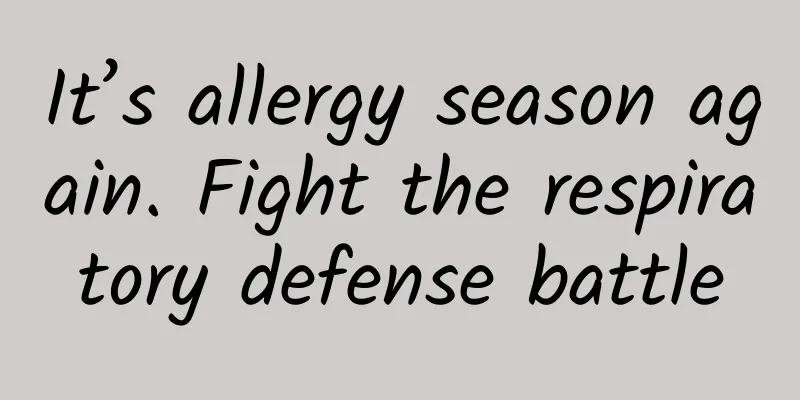It’s allergy season again. Fight the respiratory defense battle

|
The spring breeze brings warmth and flowers bloom, it should be the most pleasant season, but do you have friends around you who sneeze and cough all day long? They may be suffering from allergies! Allergies are caused by the human immune system being too sensitive, mistaking pollen for an "enemy" and releasing substances such as "histamine," which can cause itchy noses, sneezing, coughing, and even asthma. Spring is the peak season for allergic diseases, so we remind everyone that people with allergies should stay away from allergens and protect their respiratory tract. Currently, led by the Department of Respiratory and Critical Care, and in collaboration with multiple disciplines such as Otolaryngology, Pediatrics and Dermatology, our hospital has launched a specialized clinic for allergic diseases (allergic diseases), providing one-stop service and giving patients the most appropriate treatment options. Allergies or colds? How to tell the difference in one minute If you have respiratory discomfort, you should first distinguish whether it is an allergy or a cold! Do not take medicine at random. You can refer to the table below to understand the difference between the two. Special reminder: If you experience the following symptoms, it may be asthma or a severe allergic reaction. Go to the hospital immediately and don’t try to endure it! There is a whistling sound in the chest when breathing Waking up in the middle of the night, out of breath climbing stairs Conventional drugs are ineffective and symptoms continue to worsen Recognize allergies and scientific treatment is the key. How should we deal with allergic diseases scientifically? First of all, don't take antibiotics without authorization, because allergies are not bacterial infections! For allergic diseases, we emphasize avoiding contact with allergens and standardized treatment. Taking allergic asthma treatment as an example First of all, it is recommended to do allergen testing and avoid contact with known allergens. This is a key measure to treat allergic asthma. (1) Standardized drug treatment Relief medication: Also known as emergency medication, it refers to medication used on demand. It is mainly used to quickly relieve the symptoms of asthma attacks. Keep it at home and carry it with you when you go out. Controller medications: These are medications that are taken daily or long-term. These medications work primarily through anti-inflammatory effects to keep asthma under clinical control. (2) Allergen-specific immunotherapy (commonly known as desensitization therapy) It refers to a treatment method that, based on the identification of the main allergens that cause allergic diseases, exposes patients to gradually increasing doses of allergen extracts (standardized allergen preparations) repeatedly to allow the body's immune system to develop tolerance to such allergens, thereby controlling or allergic symptoms. (3) Anti-inflammatory and anti-allergic drugs This type of drug has pharmacological activities such as stabilizing cell membranes, reducing the release of inflammatory mediators, and antagonizing inflammatory mediators and receptors. It is mainly used clinically as an adjuvant treatment for patients with allergic asthma who have poor results from conventional treatment, especially those with allergic rhinitis and allergic skin diseases. These drugs include: (1) leukotriene modifiers (2) antihistamines. (4) Anti-IgE therapy Allergic diseases can also be treated with biological agents, of which anti-IgE therapy is one of them. In short, it is recommended that the specific treatment plan be formulated by a professional physician after a comprehensive evaluation, and do not take medication on your own. Practical anti-allergy tips that you can do at home! 1. Three-piece suit for going out (1) Check the weather: Pay attention to the pollen index. When the pollen concentration is high (sunny or windy), stay out of the house less, especially between 10 a.m. and 4 p.m. (2) Wear a mask: Ordinary masks have limited effect in blocking pollen. If conditions permit, you can wear an anti-pollen mask. (3) Wear glasses: Wind goggles or ordinary glasses can reduce the amount of pollen entering the eyes. 2. Four steps to go home (1) Beat your clothes outside the door to shake off the pollen; (2) Wash your nose with saline; (3) Change into home clothes and wash dirty clothes immediately; (4) Close the windows and turn on the air purifier. 3. Home minesweeping (1) Bedding: Wash quilt covers and pillowcases in 60°C hot water every week. (2) Carpets: Put them away during allergy season and replace them with easily scrubbed floor mats. (3) Green plants: Place fewer flowering plants indoors, and change the water of hydroponic plants frequently to prevent mildew. Allergies are essentially an "over-defense" of the immune system. Scientific protection can reduce the "mischief" of the immune system and significantly improve the quality of life. Keep a symptom diary, do a good job of environmental control, and cooperate with individualized treatment to make breathing smooth again! |
>>: Prevention is better than cure: Prevention and treatment of common diseases during pregnancy
Recommend
I haven't had my period for a month after I was weaned. What's going on?
It is normal for menstruation to be delayed or ea...
Is frequent use of condoms harmful to women's health?
Speaking of contraceptive methods, everyone shoul...
Is cervical screening painful?
In our lives, many women suffer from gynecologica...
Why do I often have bruises on my body?
Expert of this article: Fang Jie, Associate Chief...
Can I get pregnant two days after my period ends?
Regarding the question of whether you can get pre...
Small pimples on the cervix
The female uterus and cervix are one of the most ...
What's going on with the bleeding below?
What's the reason for bleeding when you pinch...
What are the soil requirements for the Dance of ...
Dancing with Grace is a variation of Jade Plant, ...
What should a 46-year-old woman do if she has amenorrhea?
Amenorrhea occurs in almost every middle-aged or ...
Hyperthyroidism during pregnancy
During pregnancy, women are prone to thyroid enla...
Stay away from the groundhogs! Stay away from the groundhogs! Stay away from the groundhogs!
Recently, an infuriating piece of news has been c...
Is it normal to have periods at 10 years old?
The sign of every woman's maturity is menstru...
I am weak after pregnancy.
The physical and mental health of pregnant women ...
Why is vaginal itching and leucorrhea
For most women, vaginal itching and excessive vag...
Six months pregnant belly falling
If you are six and a half months pregnant and fee...









